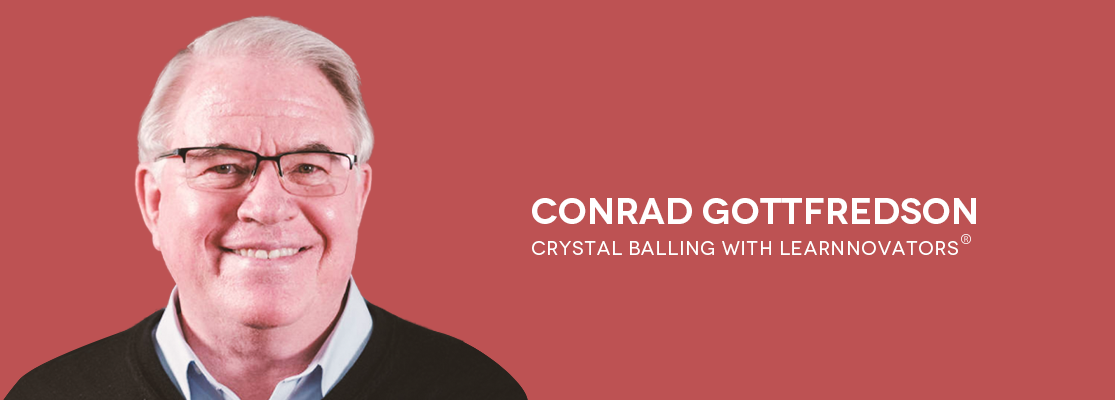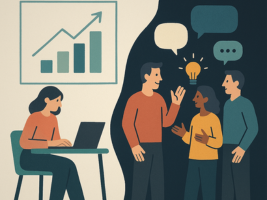CONRAD GOTTFREDSON – CRYSTAL BALLING WITH LEARNNOVATORS
ABOUT CONRAD GOTTFREDSON:
Dr. Conrad Gottfredson is a founding partner, and the Chief Learning Strategist, at APPLY Synergies, a 5 Moments of Need company that specializes in helping learning professionals design, develop, maintain, and measure effective learning and performance support through the 5 Moments of Need® design methodology.
Con has deep experience helping organizations optimize their entire learning ecosystem. He helps companies identify and implement the 5 Moments of Need Solutions along with the methodology, technology, and organizational support infrastructure they need to be able to design, build, implement, optimize and evaluate those solutions. He has designed, developed, and managed many hundreds of learning and performance solutions addressing the complete scope of delivery systems, strategies, audiences, and settings. These settings have ranged from small to large international corporations, governmental agencies, universities, and religious organizations.
Con has also worked with Learning and Development teams to establish collaborative instructional development and maintenance processes to eliminate wasteful redundancies and focus on specialized skills and knowledge. These collaborative development models have provided significant cost benefits in environments of constrained resources and overwhelming development requirements.
He is the co-author of: Innovative Performance Support: Tools and Strategies for Learning in the Workflow and a contributing author to Timothy Clark’s book: The Employee Engagement Mindset: The Six Drivers for Tapping into the Hidden Potential of Everyone in Your Company. He has developed and presented public seminars to many thousands of participants both nationally and internationally.
ABOUT THIS INTERVIEW SERIES:
Crystal Balling with Learnnovators is a thought-provoking interview series that attempts to gaze into the future of e-learning. It comprises stimulating discussions with industry experts and product evangelists on emerging trends in the learning landscape.
Join us on this exciting journey as we engage with thought leaders and learning innovators to see what the future of our industry looks like.
THE INTERVIEW:
LEARNNOVATORS: We are great fans of you, Con. You, along with Bob Mosher, have been working towards your mission to advance workflow learning and performance in organizations around the world. As an evangelist for ‘The 5 Moments of Need’ – framework for ‘gaining and sustaining effective on-the-job performance of employees and work teams’, you have been striving to influence the community on the significance of prioritizing performance support over the traditional approaches to workplace training, and enlightening them on the ways to bring that mindset into learning design. It’s an honor to have you here today to discuss the past, present, and future of workplace learning in three questions.
1. LEARNNOVATORS (THE PAST): According to Elliot Masie (from our interview with him available here), “It is not about memorizing the steps – it is the ability to DO IT – and increasingly that will include prompted steps… When Sully Sullenberger landed the plane on the Hudson River – in 205 seconds from birds to water, he used checklists for readiness – not his memory. The success was the lives he saved not what he had memorized.” You too have been advocating for effective performance in the workplace as the end game for every learning solution we build for many years. However, as we know, workplace learning strategies have mostly been restricted to the traditional (formal) training formats. As a practitioner who has been able to greatly influence the community on the need to move beyond conventional workplace learning to embedded performance support solutions, how do you look at this (past) scenario? And, what are your experiences being part of this (past) journey?
CONRAD GOTTFREDSON: The Sully scenario is as relevant today as it was when it happened. It’s all about getting to just what you need at the moment of need. Sully was facing a terrifying moment of Solve where the consequences of failure were catastrophic. Had he followed his intuition, everyone on that plane could have potentially died. Instead he accessed just what he needed – that checklist – and lives were saved.
2. LEARNNOVATORS (THE PRESENT): To quote Nick Shackleton Jones (from his article available here), “When we talk about ‘performance consulting’ or ‘point-of-need support’, our aim should be to reduce learning as much as possible in order to improve performance. Often, the aim of organizational L&D is ultimately to improve performance so – paradoxically – the main job of L&D teams is increasingly to reduce the need to learn (as more opportunities to externalize knowledge – for example using mobile devices – become available)”. However, as we understand, we haven’t been able to strictly follow this approach due to various reasons, and are still mostly dependent on formal training interventions (that basically increases the need to learn) as the primary option. In this context, we recall your message that “Although learning is clearly a prerequisite for performance, to have learned does not always translate into or guarantee performance. This is one of the hardest things for training departments to understand.” As a practitioner who has been guiding many organizations to re-imagine their workplace learning (by shifting from a ‘learning’ mindset to a ‘performance-first’ mindset), how do you look at this (present) scenario? And, what are your experiences being an active part of this (present) journey?
CONRAD GOTTFREDSON: First of all, when we perform in the flow of work, we are learning through experience. The learning moments of Apply, Solve, and Change occur in the flow of work and merit intentional support. My only struggle with formal learning is when it doesn’t lead to effective performance in the workflow. Learning is a means to an end, and when it comes to organizational learning, the end-game is effective performance on the job. In addition, training departments must extend their reach into the workflow – where real learning takes place. Formal learning is only the starting point. Skills introduced through formal instruction require integration, adaption, and enrichment through ongoing performance in the flow of work. We can and must intentionally support the full journey learners must take to become and remain truly competent in their ever-changing environments of work.
3. LEARNNOVATORS (THE FUTURE): According to Sugata Mitra, “Knowing is obsolete…”! He explains “the end of knowing” as “being the end of that way of being in the world where you are supposed to know — before you do.” He recommends replacing acquiring knowledge that is meant for “just-in-case” with learning “just-in-time”. Though we are sceptical of this possibility (where emerging technologies render learning obsolete), we too believe that the future belongs to smart performance support solutions (‘Just In Time’, ‘Just Right’, ‘Just Enough’, ‘Just for Me’) powered by AI that can sense when and where support is in need and react to the situations automatically (without even asking for help), and at scale. This (the concept of transformational performance support), as we understand, is something that you have been envisioning for a long time now. As an evangelist who has been continuously inspiring the community on the future prospects of smart performance support, what are your thoughts on the future of workplace learning? And, what’s your vision for this future?
CONRAD GOTTFREDSON: Today’s workforce faces the challenge of unrelenting change so internalizing knowledge and skills can become a liability. Organizations today prosper and survive to the degree their workforce is able to learn at or above the speed of change. So how do we enable an adaptive workforce? The smarter that system is the better since speed to changed performance is crucial. However, the solution to organizational learning agility requires much more than smart performance support. The content delivered through these smart systems must be kept current and consumable by technology that can know what that content is and figure out what to do with it. We are seeing a resurgence of content management practices (including single-source publishing, metadata management) that can and must become a part of our future work.
LEARNNOVATORS: Before we sign off, we thank you so much for your time today, Con. We’ve had an amazing time reading your insights with many valuable takeaways. We’ll take these learnings to foster our commitment to practice and promote continuous learning and innovation at work. Thank you!






